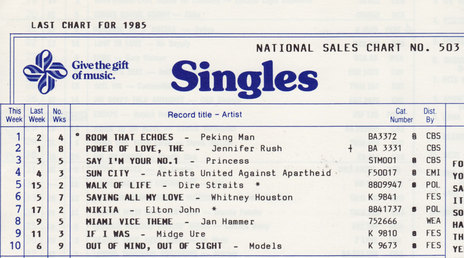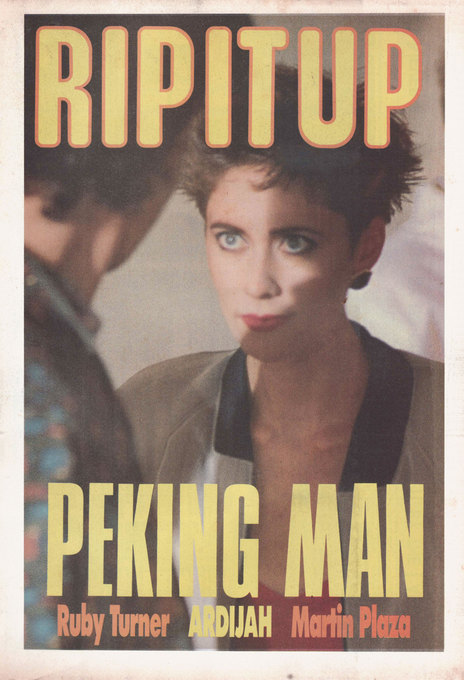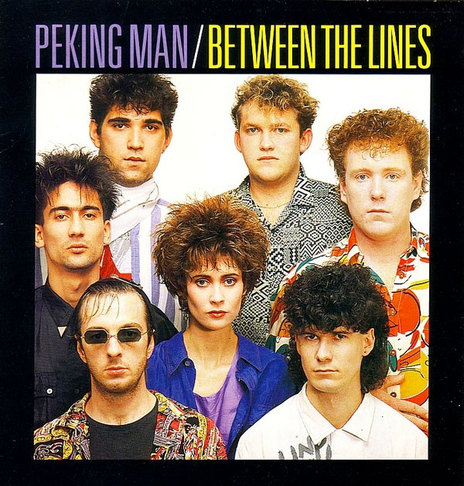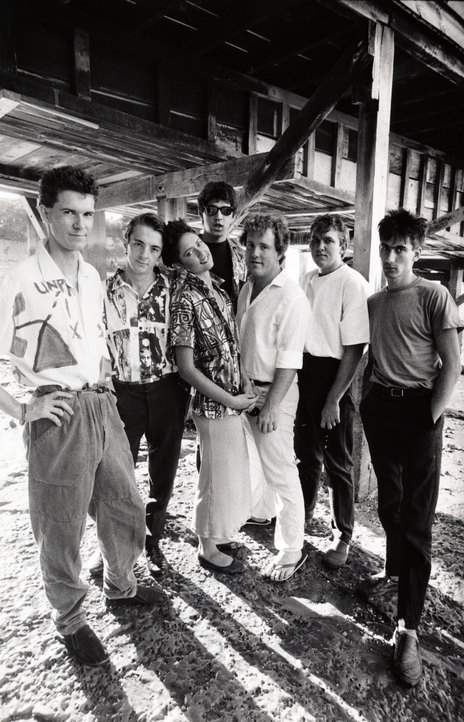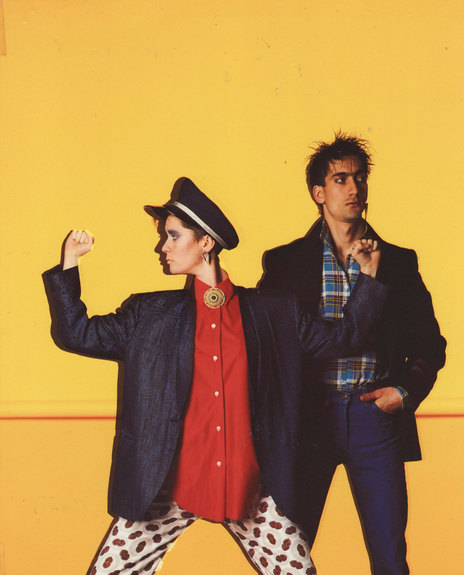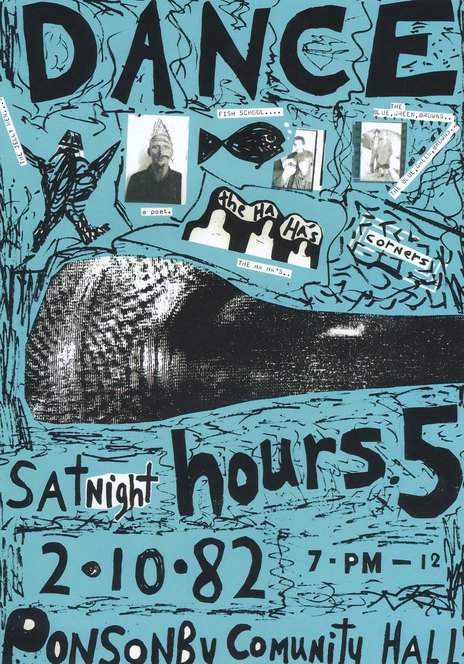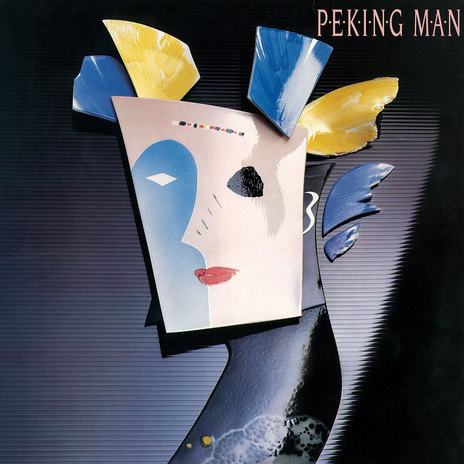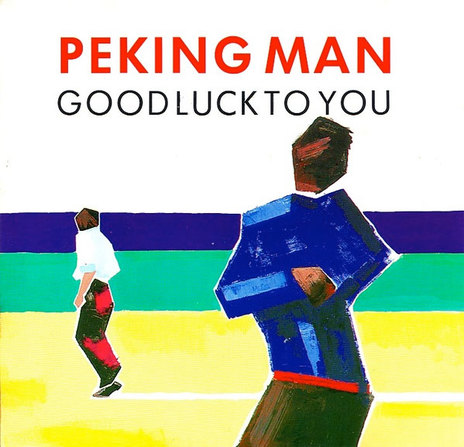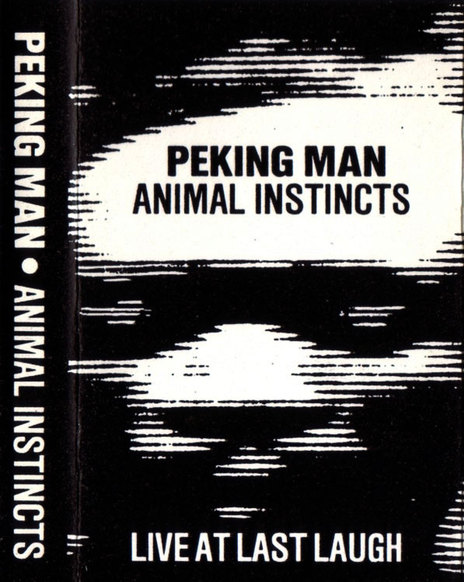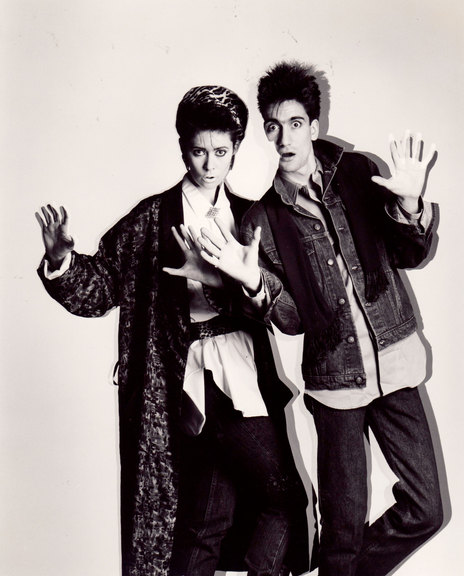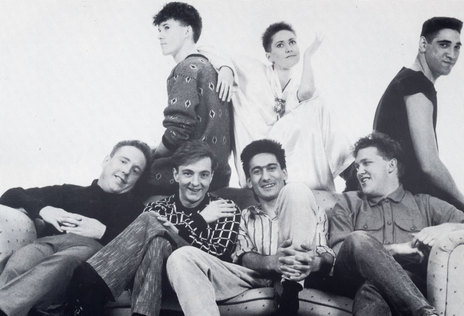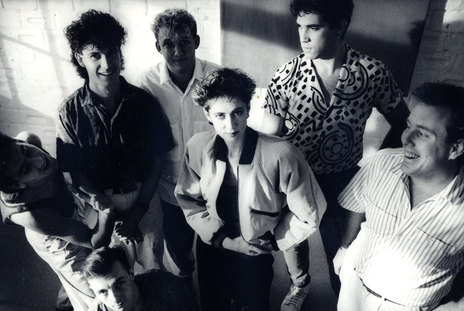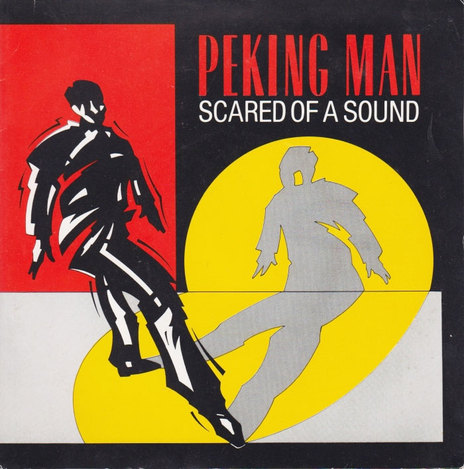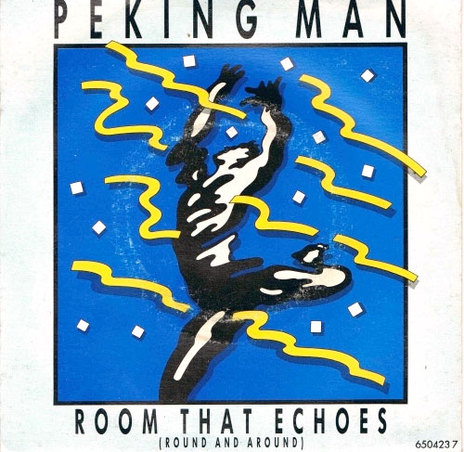The first recorded release by Peking Man that was reviewed in Rip It Up magazine was in a “Tape Only” column of the July 1983 issue, where they were in good company as another tape-only release that month was The Clean’s Odditties. The Peking Man release was the 30 minute live-in the-studio release Animal Instincts on the Last Laugh Studio’s label.
The group were already planning their debut vinyl release with the four song 12-inch being released on the Unsung label in 1983 with ‘Venetian Blinds’ as opening track along with ‘Jungle Book’, ‘Living In Bits’ and ‘Plastic Head’.
Now we are seven
The year started for Peking Man with appearances at two outdoor summer concerts – the Sweetwaters Festival and the Paihia Festival. After a series of rough reviews in Rip It Up magazine they nearly gained a positive from Russell Brown in the February 1984 Sweetwaters coverage: “Peking Man sounded impressive but I’d have to opine that was more to do with the mixing than the music. Still, they were popular with the crowd and they are getting better at what they do.”
By mid-1984 there were seven in the band. Pat Urlich’s younger sister Margaret was added to the line-up along with Jay “Bula” Foulkes on percussion. That year the group released the first of two singles on John Doe’s Hit Singles label, via WEA Records – ‘Scared Of The Sound’ b/w ‘Pull It Apart’ was released in October 1984.
Margaret was 20 years old when she joined Peking Man and she was participating in a Labour Department “Spats Scheme” developing her dancing and singing talents. Prior to joining she had sung background vocals and operated lights for the group.
When Peking Man were interviewed by Shake! magazine (Jan/ Feb 1986) Margaret recalled, “I saw them about two years ago at the Esplanade and I was really blown away. I decided that I would like to be in the band and six months later they asked me to join.”
In the same interview (with writer Brendan Fitzgerald), the group noted a change to their approach to songwriting. “Lately, in the last six months, we’ve started writing individually,” says Perry Marshall. “The output’s increased, the songs are getting better, so I think it’s paying off.” Bassist Tim Calder added, “The final product though is still very much the result of us all sweating together in one room, but the essence of the song is coming from one person.” A shared, portable 4-track recording system also helped individual band members to write more effectively.
Lift Your Head Up High
The second release on the Hit Singles label – in both 7-inch and 12-inch formats was ‘Lift Your Head Up High’. The song caught the attention of CBS A&R man Gilbert Egdell, who spoke to AudioCulture in 2015. “I was driving on Shakespeare Road, on my way to work and listening to Radio Hauraki, it was prime time and they played ‘Lift Your Head Up High’ – a brilliant track with a brilliant vocal by Margaret Urlich. I was driving to town thinking that’s incredible, so I went to a record retailer and bought a copy. I took it into Murray Thom [CBS MD] and played it. He loved it too and it was his first big signing. We got the band in and talked about doing another single.”
‘Lift Your Head Up High’ peaked at No.14 on the NZ Singles Chart and charted for 14 weeks.
‘Lift Your Head Up High’ peaked at No.14 on the NZ Singles Chart and charted for 14 weeks. CBS also released ‘Lift Your Head Up High’ with “Re-Recorded and Re-Mixed” in brackets and a different B-side, ‘Side By Side’. The group made the move to CBS, as John Doe was winding down his Hit Singles label.
Peking Man were very pleased to move to CBS Records. The multinational label had a track record having success with local music and breaking Sharon O’Neill across the Tasman. The 26-year-old managing director Murray Thom was an added bonus for Peking Man. Thom was a sales and marketing whiz – in possession of a healthy-sized ego – so he was keen to score a home run or two with New Zealand music.
In the June 1986 Rip It Up interview, Duncan Campbell noted that the band were able to veto plans to sell them in apartheid South Africa with “little or no hassle”. Perry Marshall said, “CBS have been really good like that, they’ll always listen to what we have to say, and play the game as a team. It’s not ‘us against them’, which is great.”
At one point Peking Man “band politics” required that most members of the band be present for interviews. At times even their manager was present, an unwanted presence for many journalists and editors. Rip It Up writer Duncan Campbell professionally coped with the small classroom of musicians he faced, writing, “One does not ‘interview’ Peking Man, one holds a six way conversation (seven counting manager Dave [Fearon], as bassist Tim Calder is absent).”
Room That Echoes
Musician and producer Bruce Lynch and engineer Graeme Myhre had recently returned from the UK. Lynch had played bass with Cat Stevens and others while Myhre had been engineer for producer Tony Visconti (David Bowie, Thin Lizzy, etc). Egdell played them Peking Man and they were keen to record the band’s next single, ‘Room That Echoes’.
The group and producer/ engineer team worked well together and the debut album was recorded within six months. The group recorded both at Bruce Lynch’s home studio The Boatshed in Bayswater and at the 24-track Mandrill Studio in Parnell.
CBS released ‘Room That Echoes’ b/w ‘Vision High’ in November 1985 and the single stayed at No.1 on the NZ Singles Chart for two weeks.
CBS released ‘Room That Echoes’ b/w ‘Vision High’ in November 1985 and the single stayed at No.1 on the NZ Singles Chart for two weeks. Neville Hall, the writer of the A-side recalled its genesis to Rip It Up (June 1986): “When I first wrote the song, I wasn’t even going to bring it to the band. It took me five minutes to write – and then Margaret heard me playing it one day and said we should do. It has a menacing, slightly malicious air to it. I still don’t know how it got to No.1.”
In the Shake! Interview (Jan/ Feb 1986), the group were asked whether the dancing figure in the ‘Room That Echoes’ video, directed by John Day, was animated or if it was Margaret.
“Yes, it’s me! What they did was put a filter on the camera and I could see my silhouette on the monitor. The room was all blue and they superimposed my silhouette onto the background. The effects were generated by some machine or other.”
When asked about Margaret appearing in the video alone, bassist Tim Calder explained, “It’s a song about isolation and wanting to be isolated.”
Margaret Urlich won Best Female Vocalist in the 1985 NZ Music Awards but best result from that night was meeting her fellow-finalists or performers on the night, who would become future collaborators in the very successful When The Cat’s Away.
When teen-oriented Shake! magazine wanted pop stars to wear some fashion in their Jan/ Feb 1986 issue, Margaret Urlich and Dianne Swann obliged, along with Jordan Luck and Andrew Fagan.
Margaret and brother Pat Urlich appeared in a slick fashion feature for Shake! magazine. In May 1986 another single was released – ‘Good Luck To You’ b/w ‘Coming Event’ – peaking at No.21 and charting for 11 weeks.
The album
In 1986, I was publishing RipIt Up and I visited CBS Records to look at new publicity photos of Peking Man. There was one, and one only, casual snapshot of Margaret Urlich that caught my eye. I suggested to Gilbert Egdell that the casual shot would make a great magazine cover. Gilbert said, “Just take all the photos, if you use the one of Margaret, I don’t know anything about it!”
The photo of Margaret appeared on the cover of the June 1986 Rip It Up and the group’s self-titled debut album was released in the first week of July. The album peaked at No.6 on the NZ Album Chart and charted for 11 weeks.
Peking Man cleaned up at the 1986 NZ Music Awards. They won eight awards: Album of the Year, Single of the Year (‘Room That Echoes’), Top Group, Best Female Vocalist, Best Male Vocalist, Best Producer (Bruce Lynch), Best Engineer (Graeme Myhre) and best Album Cover (designer Phil O’Reilly).
In September 1986 Margaret Urlich joined friends Debbie Harwood, Dianne Swann and Annie Crummer for a weekend at Auckland nightclub Wildlife, performing as When The Cat’s Away. The light-hearted romp through soul songs and New Zealand classics was a sell-out. Urlich loved the fun she had with her new friends.
Margaret goes solo
CBS New Zealand wanted to have international success with their local signings and to play in the big league they had to be in tune with the Sydney offices of CBS. “We had a lot of support from Peter Bond our Asia Pacific director in Sydney,” said Egdell. “I remember playing him the 12-inch of ‘Lift Your Head Up High’ and he loved it.”
Exactly when Margaret Urlich chose to go solo is unclear. “I can vividly remember having a meeting with Margaret in Murray Thom’s office,” Egdell recalled. “We convinced her to do a solo career – ‘You’ve done an album, it’s done very well, but it’s time to move on.’ She was a little apprehensive about stepping out on her own. In hindsight, maybe she was too young.”
Egdell acknowledges that the push came from across the ditch. “Bond called the shots! They wanted her in Australia. If I have some regrets about that whole thing – she was thrust into the whole machine – and she didn’t have any support network over there.”
The meeting with Margaret and CBS took place in the second half of 1986, before Murray Thom and Gilbert Egdell both left the company later that year. Margaret’s departure from Peking Man was not known to the public until June 1987.
Peking Man continued to tour North Island venues in the last half of 1986 and did South Island dates in January 1987. On the first weekend of March, Peking Man played the lucrative Ponsonby rock venue The Gluepot. The following weekend Margaret Urlich was back there with the new “hot ticket” in town, When The Cat’s Away.
In Rip It Up May 1987 a When The Cat’s Away story appeared to coincide with their May national tour. The story reassured fans that the singers would return to their solo careers or in Margaret Urlich’s case, head for Sydney with Peking Man. However the June Rip It Up had the big news in the small print of the “Rumours” column: “Margaret Urlich has left Peking Man to go solo.”
Peking Man involuntarily returned to their old line-up and continued for a short time with only Pat Urlich fronting the group.
